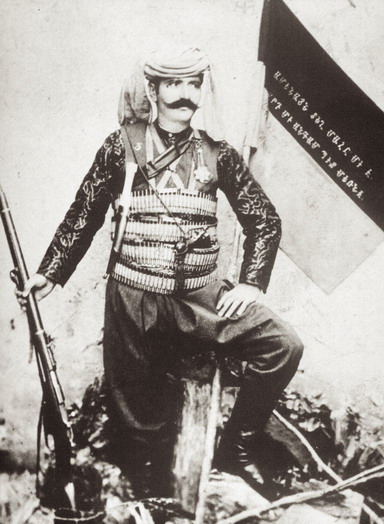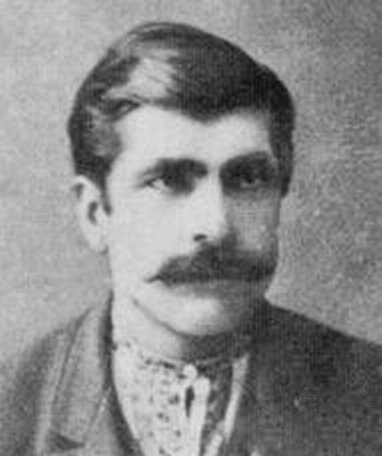|
Aghbiur Serob
Serob Vardanian (also spelled Serop Vartanian, ; 1864 – 24 November 1899), better known by his '' noms de guerre'' Aghbiur Serob () and Serob Pasha (), was a famed Armenian military commander who organized a guerrilla network that fought against the Ottoman Empire during the latter part of the 19th century. Life as a revolutionary Serob was born in 1864 in the village of Sokhord (modern-day Serinbayır, Ahlat) in the district of Ahlat in the Bitlis Vilayet of the Ottoman Empire. Around the age of twenty, he got into a fight with two Turks and ended up killing one of them. The murder forced him to flee to Constantinople. In 1892, he travelled to Romania and opened a coffee shop there, intending to use the shop as a meeting site for young revolutionaries. He eventually joined the Armenian Revolutionary Federation and returned to Ottoman Armenia, in Bitlis Vilayet, where he took up arms to defend the local Armenian population from Ottoman and Kurdish attackers. In 1898, in ... [...More Info...] [...Related Items...] OR: [Wikipedia] [Google] [Baidu] |
Ahlat
Ahlat (; ) is a town in Turkey's Bitlis Province in Eastern Anatolia Region. It is the seat of Ahlat District.İlçe Belediyesi , Turkey Civil Administration Departments Inventory. Retrieved 30 January 2023. The town had a population of 27,563 in 2021. The town of Ahlat is situated on the northwestern shore of . The mayor is Abdulalim Mümtaz Çoban ( AKP). History Ahlat, known by its Armenian name of Khlat or Chliat in the ancient and medieval period, was once a part of the district of[...More Info...] [...Related Items...] OR: [Wikipedia] [Google] [Baidu] |
Revolutionaries
A revolutionary is a person who either participates in, or advocates for, a revolution. The term ''revolutionary'' can also be used as an adjective to describe something producing a major and sudden impact on society. Definition The term—both as a noun and adjective—is usually applied to the field of politics, but is also occasionally used in the context of science, invention or art. In politics, a revolutionary is someone who supports abrupt, rapid, and drastic change, usually replacing the status quo, while a reformist is someone who supports more gradual and incremental change, often working within the system. In that sense, revolutionaries may be considered radical, while reformists are moderate by comparison. Moments which seem revolutionary on the surface may end up reinforcing established institutions. Likewise, evidently small changes may lead to revolutionary consequences in the long term. Thus the clarity of the distinction between revolution and reform is more c ... [...More Info...] [...Related Items...] OR: [Wikipedia] [Google] [Baidu] |
Sasoun
Sason is a town in the Batman Province of Turkey. It is the seat of the Sason District.İlçe Belediyesi Turkey Civil Administration Departments Inventory. Retrieved 30 January 2023. Its population is 12,696 (2021). It was formerly known as Kabilcevz. Toponymy ''Sason'' derives from the name of the historical region . In the Armenian tradition, the name of Sasun (from earlier ''Sanasunk'') is traditionally associated with Sanasar (i.e., biblical Sharezer), the son of the Assyrian king |
Brigands
Brigandage is the life and practice of highway robbery and plunder. It is practiced by a brigand, a person who is typically part of a gang and lives by pillage and robbery.Oxford English Dictionary second edition, 1989. "Brigand.2" first recorded usage of the word was by "H. LUTTRELL in Ellis ''Orig. Lett.'' II. 27 I. 85 Ther ys no steryng of none evyl doers, saf byonde the rivere of Sayne..of certains brigaunts." The word brigand entered English as ''brigant'' via French from Italian as early as 1400. Under the laws of war, soldiers acting on their own recognizance without operating in chain of command are brigands, liable to be tried under civilian laws as common criminals. However, on occasions brigands are not mere malefactors, but may be rebels against a state or union perceived as the enemy. Bad administration and suitable terrain encourage the development of brigands. Historical examples of brigands (often called so by their enemies) have existed in territories of Franc ... [...More Info...] [...Related Items...] OR: [Wikipedia] [Google] [Baidu] |
Kurdish People
Kurds (), or the Kurdish people, are an Iranian peoples, Iranic ethnic group from West Asia. They are indigenous to Kurdistan, which is a geographic region spanning southeastern Turkey, northwestern Iran, northern Iraq, and northeastern Syria. Consisting of 30–45 million people, the global Kurdish population is largely concentrated in Kurdistan, but significant communities of the Kurdish diaspora exist in parts of West Asia beyond Kurdistan and in parts of Europe, most notably including: Turkey's Central Anatolian Kurds, as well as Kurds in Istanbul, Istanbul Kurds; Iran's Khorasani Kurds; the Caucasian Kurds, primarily in Kurds in Azerbaijan, Azerbaijan and Kurds in Armenia, Armenia; and the Kurdish populations in various European countries, namely Kurds in Germany, Germany, Kurds in France, France, Kurds in Sweden, Sweden, and the Kurds in the Netherlands, Netherlands. The Kurdish language, Kurdish languages and the Zaza–Gorani languages, both of which belong to the Wes ... [...More Info...] [...Related Items...] OR: [Wikipedia] [Google] [Baidu] |
Kevork Chavoush
Kevork Ghazarian (; 1870 – 28 May 1907), commonly known as Kevork Chavush or Gevorg Chaush (), was an Armenian '' fedayee'' leader in the Ottoman Empire and a member of the Armenian Revolutionary Federation. Kevork Chavush attained a legendary status during his lifetime for his extraordinary daring and valor in defense of the Armenian peasantry against harassment by marauding Turkish and Kurdish forces. He was the undisputed leader of Armenian revolutionary forces in the region of Taron-Sasun from 1904 until his death in 1907 after being wounded in a battle with the Ottoman army. Kevork's actions earned him the moniker "Lion of the Mountains" (). Early life Kevork Chavush was born Kevork Ghazarian (although his surname is given as Adamian or Melkonian in various sources) to a family of hunters in the region of Sasun, in the village of Mktink of the Psank (Psanats) district. His exact date of birth is not known, but he is believed to have been born around 1870. He received his ... [...More Info...] [...Related Items...] OR: [Wikipedia] [Google] [Baidu] |
Andranik Ozanian
Andranik Ozanian, commonly known as General Andranik or simply Andranik (25 February 186531 August 1927), was an Armenian military commander and statesman, the best known '' fedayi'' and a key figure of the Armenian national liberation movement. He became active in an armed struggle against the Ottoman government and Kurdish irregulars in the late 1880s. Andranik joined the Armenian Revolutionary Federation (Dashnaktustyun) party and, along with other '' fedayi'' (militias), sought to defend the Armenian peasantry living in their ancestral homeland, an area known as Western (or Turkish) Armeniaat the time part of the Ottoman Empire. His revolutionary activities ceased and he left the Ottoman Empire after the unsuccessful uprising in Sasun in 1904. In 1907, Andranik left Dashnaktustyun because he disapproved of its cooperation with the Young Turks, the party which years later perpetrated the Armenian genocide. Between 1912 and 1913, together with Garegin Nzhdeh, Andranik l ... [...More Info...] [...Related Items...] OR: [Wikipedia] [Google] [Baidu] |
Fedayees
''Fedayi'' (Eastern ; , , , ), also known as the Armenian irregular units, Armenian militia, or Armenian Hayduks were Armenian civilians who voluntarily left their families to form self-defense units and irregular armed-bands in reaction to the mass murder of Armenians and the pillage of Armenian villages by criminals, Turkish and Kurdish gangs, Ottoman forces, and Hamidian guards during the reign of Ottoman Sultan Abdul Hamid II in late-19th and early-20th centuries, known as the Hamidian massacres. Their ultimate goal was always to gain Armenian autonomy (for Armenakans) or independence (for Dashnaks and for Hunchaks) – depending on their ideology and the degree of oppression visited on Armenians. Some of the key fedayi figures also participated in the Iranian Constitutional Revolution that commenced during the same period, upon agreement of the ARF leaders. The Armenian term ''fedayi'' ultimately derives from the Arabic word ''fedayeen'': ''fidā'īyūn'', literal ... [...More Info...] [...Related Items...] OR: [Wikipedia] [Google] [Baidu] |
Pseudonym
A pseudonym (; ) or alias () is a fictitious name that a person assumes for a particular purpose, which differs from their original or true meaning ( orthonym). This also differs from a new name that entirely or legally replaces an individual's own. Many pseudonym holders use them because they wish to remain anonymous and maintain privacy, though this may be difficult to achieve as a result of legal issues. Scope Pseudonyms include stage names, user names, ring names, pen names, aliases, superhero or villain identities and code names, gamertags, and regnal names of emperors, popes, and other monarchs. In some cases, it may also include nicknames. Historically, they have sometimes taken the form of anagrams, Graecisms, and Latinisations. Pseudonyms should not be confused with new names that replace old ones and become the individual's full-time name. Pseudonyms are "part-time" names, used only in certain contexts: to provide a more clear-cut separation between one's privat ... [...More Info...] [...Related Items...] OR: [Wikipedia] [Google] [Baidu] |
Armenian Fedayi
''Fedayi'' ( Eastern ; , , , ), also known as the Armenian irregular units, Armenian militia, or Armenian Hayduks were Armenian civilians who voluntarily left their families to form self-defense units and irregular armed-bands in reaction to the mass murder of Armenians and the pillage of Armenian villages by criminals, Turkish and Kurdish gangs, Ottoman forces, and Hamidian guards during the reign of Ottoman Sultan Abdul Hamid II in late-19th and early-20th centuries, known as the Hamidian massacres. Their ultimate goal was always to gain Armenian autonomy (for Armenakans) or independence (for Dashnaks and for Hunchaks) – depending on their ideology and the degree of oppression visited on Armenians. Some of the key fedayi figures also participated in the Iranian Constitutional Revolution that commenced during the same period, upon agreement of the ARF leaders. The Armenian term ''fedayi'' ultimately derives from the Arabic word ''fedayeen'': ''fidā'īyūn'', l ... [...More Info...] [...Related Items...] OR: [Wikipedia] [Google] [Baidu] |
Yumurtatepe, Bitlis
Yumurtatepe is a village in the Bitlis District of Bitlis Province Bitlis Province (; ; ) is a province of eastern Turkey, located to the west of Lake Van. It takes its name from the central city, Bitlis. Its area is 8,294 km2, and its population is 353,988 (2022). The province is considered part of Western ... in Turkey. Its population is 502 (2021). It was formerly known as Papşin or Papşén. Before the deportations and genocide of the village's Armenian inhabitants, Papşin/Babshen had a population of 325 individuals in 1909. Located to the village's west was Surp Harutyun church and to its East was a chapel named Lusabdugh Surp Sahak. References Villages in Bitlis District {{Bitlis-geo-stub ... [...More Info...] [...Related Items...] OR: [Wikipedia] [Google] [Baidu] |
Kurds
Kurds (), or the Kurdish people, are an Iranian peoples, Iranic ethnic group from West Asia. They are indigenous to Kurdistan, which is a geographic region spanning southeastern Turkey, northwestern Iran, northern Iraq, and northeastern Syria. Consisting of 30–45 million people, the global Kurdish population is largely concentrated in Kurdistan, but significant communities of the Kurdish diaspora exist in parts of West Asia beyond Kurdistan and in parts of Europe, most notably including: Turkey's Central Anatolian Kurds, as well as Kurds in Istanbul, Istanbul Kurds; Iran's Khorasani Kurds; the Caucasian Kurds, primarily in Kurds in Azerbaijan, Azerbaijan and Kurds in Armenia, Armenia; and the Kurdish populations in various European countries, namely Kurds in Germany, Germany, Kurds in France, France, Kurds in Sweden, Sweden, and the Kurds in the Netherlands, Netherlands. The Kurdish language, Kurdish languages and the Zaza–Gorani languages, both of which belong to the Wes ... [...More Info...] [...Related Items...] OR: [Wikipedia] [Google] [Baidu] |






